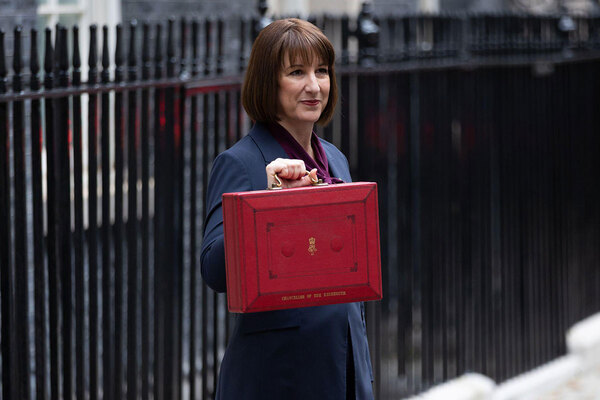The editor’s rundown: a Budget for short-term pain relief and long-term gain?
A week on from Rachel Reeves’ first Budget as chancellor, Social Housing editor Sarah Williams rounds up the main takeaways for housing, as well as the month’s key finance and regulatory stories

It was a Budget a long time in the making – Labour’s first in government for 14 years, and nearly four months into its return to power.
While the housing sector will need to wait until the multi-year Spending Review in the spring for clarity on a number of longer-term policy areas, the chancellor’s Autumn Statement and several announcements in the lead-up have given the sector plenty to get its teeth into.
Rent settlement, extra funding and Right to Buy changes
Not least is the promise of a new rent settlement of “at least” five years that continues the current formula of Consumer Price Index (CPI) plus one per cent. This brings much-needed certainty, even if not for the full 10-year period many had called for.
In a consultation launched alongside the Budget on 30 October, and running until 23 December, the government said the new settlement would begin on 1 April 2026 and would be in place until 31 March 2031 “at least”.
The government’s intention is for there to be another five-year settlement following on from this. Views are also being invited on alternative settlement lengths of seven or 10 years, or a “rolling” five-year settlement.
Housing providers will benefit from a £500m “top-up” to the current Affordable Homes Programme, too, as well as increased funding for heat decarbonisation and energy-efficiency schemes through a £3.4bn commitment to the Warm Homes Plan (although details are yet to be set out).
Changes to Right to Buy discounts will also keep around 25,000 homes in the sector over five years, a policy paper published alongside the Budget has suggested.
In addition, a boost to building safety remediation funding – bringing the total to more than £1bn in 2025-26 – will include some funding to speed up work on social housing homes, government has said.
Sector concerns
Other policies remain untouched. For example, the effective freeze on Local Housing Allowance rates expected from April 2025 under the last administration remains in place – to the concern of commentators like the Joseph Rowntree Foundation.
The freeze came despite several interventions intended to support low-income households.
A number of housing providers, like many businesses, have raised concern about the costs to be incurred by sweeping changes to employer National Insurance contributions, and the threshold at which these kick in.
This, however, brings us to the point of the Budget, as presented by Ms Reeves: the need to ensure sufficient revenues are raised to balance the books on day-to-day government spending. And, crucially, resetting the fiscal rules to enable greater capital expenditure on public services and infrastructure.
The ‘most important’ element?
The new fiscal rules dictate that national debt will now be measured as “net financial debt”, meaning that not only liabilities on the government balance sheet, but also financial assets will be counted. These changes are “probably the most important” announcement in the Budget, according to Peter Freeman, the chair of Homes England, speaking earlier this week.
“You cannot, in a government that has to live short term [and] hand-to-mouth – which it does if it doesn’t put assets on the books – fund things you need that are going to be there for 50 years and probably take 15 years to get there,” Mr Freeman said.
Social Housing sat down with Mr Freeman and Peter Denton, the agency’s chief executive, at the Homes England Investment Symposium on Monday (4 November), to discuss the key takeaways from the Budget, and what might follow. Read the full interview here.
Deals, development and regulation
Beyond the Budget, it has been a busy month for deals, mergers and regulation.
In an eye-catching tie-up, Hyde Group announced on 31 October it had acquired property management company Pinnacle in a move its chief executive dubbed “game-changing”. The firm, which manages around 70,000 homes nationally and owns two for-profit registered providers, will operate as a subsidiary of Hyde.
For fund manager Gresham House, announcements over the past month have included both endings and beginnings. First, it announced plans to execute the managed wind-down and sale of its original for-profit Resi Housing. More recently, it unveiled a partnership with Places for People’s own fund manager, Thriving Investments, to create a shared ownership platform of scale.
Further details of two mergers between housing associations also emerged during the month.
Longhurst Group, the 24,000-home Midlands landlord, revealed that the structure of its upcoming merger with Grand Union will see it transfer into the smaller association.
And Housing Plus Group and its smaller West Midlands neighbour Wrekin revealed the intended top team for their combined business, which is on track to complete early next year after its respective boards approved the merger plans.
In the world of regulation, the first C4 grade was handed out in October, and findings from the English regulator’s Statistical Data Return showed that private registered providers brought nearly 37,500 homes up to the Decent Homes Standard in the latest full financial year. You can find links to all the month’s key regulatory stories below.
Finally, our special report this month turns the microscope on government-funded starts and completions in Scotland, Wales and Northern Ireland in the latest financial year, finding a fall of nine per cent. Read the full report from Chloe Stothart and Robyn Wilson here.
Today marks just two weeks until we open the doors to this year’s Social Housing Annual Conference, chaired by Nicholas Watt, political editor of the BBC’s Newsnight programme.
Join us to hear from a range of experts, including Paul Johnson, director of the Institute of Fiscal Studies; Shahi Islam, director of affordable housing at Homes England; Bernadette Conroy, chair of the Regulator of Social Housing; and Rokhsana Fiaz, mayor of the London Borough of Newham.
I hope to see you there.
Sarah Williams, editor, Social Housing
- Homes England chair: fiscal rules ‘most important thing in Budget’ as agency takes long-term view
- Autumn Budget 2024: housing sector reacts to confirmed policies, extra £1bn for remediation, and employer costs rise
- Special report: starts and completions funded by government fall 9% in devolved nations
- Scottish government provides £22m in bond finance to two registered social landlords
- Lloyds and Barclays to provide £1bn in retrofit funding backed by National Wealth Fund guarantees
- Hyde acquires property management giant Pinnacle Group
- Notting Hill Genesis’ deputy chief executive exits
- Large London landlord reveals £90m deficit in delayed accounts
- Southern Housing issues £250m in first bond as merged entity
- Welsh government aims to boost modular with Affordable Homes Taskforce
-
Ministers propose ‘at least’ five-year rent settlement as consultation unveiled
-
Right to Buy discount cut will keep 25,000 homes in the sector, MHCLG says
-
Two landlords fail to meet consumer standards, while Yorkshire council gets top grade
-
English regulator warns sector’s financial headroom leaves ‘very little margin for error’
-
London council becomes first landlord to receive C4 grade from RSH
-
Registered providers brought 37,500 homes up to Decent Homes Standard in 2024
RELATED







